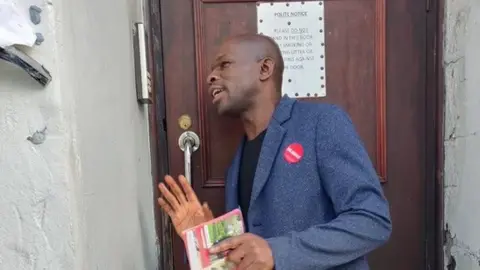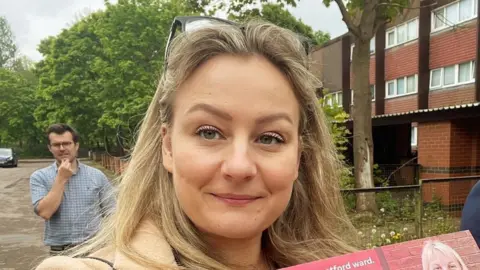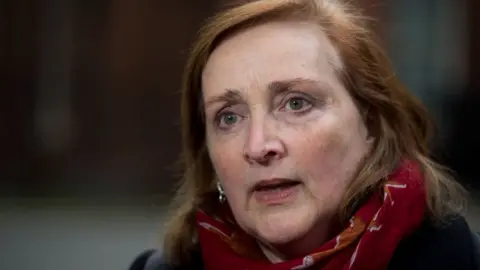Labour left-wingers angry about being blocked as MP candidates
 Maurice McLeod
Maurice McLeodLabour left-wingers claim they are being prevented from standing for the party at the next general election on flimsy pretexts, as Sir Keir Starmer seeks to remake the party in his own image.
With some MPs retiring and Labour hopeful of making big gains across the country, the battle to be selected as a candidate is heating up.
But some supporters of former leader Jeremy Corbyn claim they are being frozen out.
The Labour selection process is rather complex but the first step for any would-be candidate is to get on to a longlist (which will, in turn, be whittled down to a shortlist).
Some would-be candidates claim Labour Party staff are being tasked with uncovering historic comments or online activity that can justify stopping an individual before they even get to the longlist.
'Due diligence'
Labour's own guidelines say the party's ruling body should ensure that only "high quality candidates" are put forward for selection. They insist this is about quality control, rather than spurious blocking for political reasons.
Lauren Townsend, a Labour councillor who hoped to be her party's candidate in Milton Keynes North, was one of those who fell at the first hurdle.
With the backing of six trade unions, she had been confident she had a good chance.
 Lauren
LaurenBut that changed when she was asked to attend to a "due diligence" meeting online, where senior party figures vet candidates to check their suitability. Ms Townsend was sent a dossier of examples of her online activity that had sparked concern.
This included a tweet she had "liked" from Nicola Sturgeon, in which the Scottish First Minister announced that she'd tested negative for Covid.
Another "like" she was asked to explain was on a tweet of someone joking about Matt Hancock's resignation as health secretary - they had posted a picture of themselves pretending to cry.
Some of Lauren Townsend's activity had been more overtly hostile to the party leadership. She'd "liked" a tweet questioning Sir Keir Starmer's fitness for office, and another praising the former shadow cabinet member Andy McDonald when he quit the frontbench.
Labour has stressed that a tweet being in a due diligence report does not necessarily mean it was used as the basis of the panel's decision.
'Shadow of Corbyn'
Maurice McLeod hoped to be Labour's candidate in Camberwell and Peckham in South London. This is a safe Labour seat being vacated by the party's former deputy leader Harriet Harman.
As a serving councillor and - as he puts it - an "upstanding Labour member" on the left of the party, he felt he had a good shot.
But, like Lauren Townsend, he also failed to get through a due diligence interview.
The serving Wandsworth councillor was presented with evidence the party felt undermined his credentials to be a good Labour MP. This included "liking" a tweet by Green MP Caroline Lucas where she expressed concern that Brexit could threaten the NHS.
He had also criticised other Labour councillors online, and had left the council chamber before a vote on a definition of anti-Semitism. Writing for the Guardian, he said he'd "mistakenly" left before the vote, blaming "political inexperience".
Maurice McLeod believes the real reason for his exclusion is internal politics, and specifically his support of Labour's previous leader Jeremy Corbyn.
He told me "it's really obvious the party is determined to distance itself from anything it sees as being in the shadow of (Jeremy) Corbyn".
He believes the due diligence process should be used to root out people who have done "really dodgy things", but that it is now being used to block candidates from the left.
'Thought crime'
Emma Dent Coad says she received similar treatment. She was the Labour MP for Kensington between 2017 and 2019.
She says she was never given a reason for being blocked from standing again, and insists she's been punished for "thought crime".
Labour insists all candidates who do not make it through to the selection process are told why.
 Getty Images
Getty ImagesThe former MP concedes she's "not squeaky clean", but insists she can explain all the factors that were used to stop her standing.
She says they included a joke she had previously made about Prince Harry and referring to the former Tory mayoral candidate Shaun Bailey as a "token ghetto boy" (Ms Dent Coad insists she was quoting someone else when she used this term).
She says it would have been emotionally difficult to lose out in a vote of local party members, but to be blocked before that point in the process was "brutal".
'Very fair'
There are serving Labour MPs who are concerned about what they see as a heavy-handed approach. One from the left of the party told me there were figures at the top who were "drunk on power" and their actions went "beyond anything from the Blair years".
But for other members, the current approach is the right one. John McTernan, a former advisor to Tony Blair, told me the due diligence process is "spot on" and "very fair".
He argues that some people "not from the Labour tradition" are trying to become candidates, and that too much "flotsam and jetsam" got into parliament under Jeremy Corbyn.
He says Labour has to return "good MPs" with "mainstream Labour values" at the next election.
A Labour spokesperson said: "Due diligence is about weeding out candidates who could cause electoral damage."
'Politically motivated'
They added that the public had a right to know all candidates were of a "high standard". The party stresses that a diverse range of candidates have made it through to selection.
One long-serving parliamentarian, Jeremy Corbyn, is also at the centre of a selection row.
As things stand, he will not be the Labour candidate in Islington North, after losing the party whip in a long-running row with Sir Keir Starmer over comments he made about a report on anti-Semitism.
One left-wing Labour MP I spoke to, on condition of anonymity, said many in the party felt Mr Corbyn's suspension was "politically motivated".
Adding to the anxiety on the left, some Labour MPs are facing de-selection battles in their local constituencies.
Sir Keir Starmer may have made himself very unpopular with some would-be Labour candidates, but he appears to believe this is a necessary sacrifice to win back parts of the country the party has lost.
